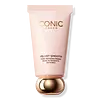What's inside
What's inside
 Key Ingredients
Key Ingredients

 Benefits
Benefits

 Concerns
Concerns

 Ingredients Side-by-side
Ingredients Side-by-side

Water
Skin ConditioningDimethicone
EmollientPEG-10 Dimethicone
Skin ConditioningGlycerin
HumectantIsononyl Isononanoate
EmollientHdi/Trimethylol Hexyllactone Crosspolymer
Pentylene Glycol
Skin ConditioningCoco-Caprylate/Caprate
EmollientDicaprylyl Ether
EmollientSilica
AbrasiveSynthetic Fluorphlogopite
Cetyl PEG/PPG-10/1 Dimethicone
EmulsifyingPhenoxyethanol
PreservativeIsododecane
EmollientSodium Chloride
MaskingDimethicone/Vinyl Dimethicone Crosspolymer
Skin ConditioningMagnesium Sulfate
Ethylhexylglycerin
Skin ConditioningPropanediol
SolventDimethiconol
EmollientDisteardimonium Hectorite
StabilisingParfum
MaskingPropylene Carbonate
SolventTin Oxide
AbrasiveArtemisia Capillaris Flower Extract
Skin ConditioningSorbitol
HumectantTocopherol
Antioxidant1,2-Hexanediol
Skin ConditioningCaprylyl Glycol
EmollientXanthan Gum
EmulsifyingAscorbic Acid
AntioxidantColloidal Gold
AntimicrobialGlutathione
CI 77891
Cosmetic ColorantCI 77491
Cosmetic ColorantCI 77492
Cosmetic ColorantCI 77499
Cosmetic ColorantWater, Dimethicone, PEG-10 Dimethicone, Glycerin, Isononyl Isononanoate, Hdi/Trimethylol Hexyllactone Crosspolymer, Pentylene Glycol, Coco-Caprylate/Caprate, Dicaprylyl Ether, Silica, Synthetic Fluorphlogopite, Cetyl PEG/PPG-10/1 Dimethicone, Phenoxyethanol, Isododecane, Sodium Chloride, Dimethicone/Vinyl Dimethicone Crosspolymer, Magnesium Sulfate, Ethylhexylglycerin, Propanediol, Dimethiconol, Disteardimonium Hectorite, Parfum, Propylene Carbonate, Tin Oxide, Artemisia Capillaris Flower Extract, Sorbitol, Tocopherol, 1,2-Hexanediol, Caprylyl Glycol, Xanthan Gum, Ascorbic Acid, Colloidal Gold, Glutathione, CI 77891, CI 77491, CI 77492, CI 77499
Isohexadecane
EmollientPolymethylsilsesquioxane
Polymethyl Methacrylate
Cetearyl Ethylhexanoate
EmollientIsododecane
EmollientDextrin Palmitate
EmulsifyingMica
Cosmetic ColorantDisteardimonium Hectorite
StabilisingCaprylic/Capric Triglyceride
MaskingSilica Dimethyl Silylate
EmollientPentaerythrityl Tetra-Di-T-Butyl Hydroxyhydrocinnamate
AntioxidantPropylene Carbonate
SolventAluminum Hydroxide
EmollientVitis Vinifera Fruit Extract
Skin ConditioningCI 77891
Cosmetic ColorantCI 15850
Cosmetic ColorantIsohexadecane, Polymethylsilsesquioxane, Polymethyl Methacrylate, Cetearyl Ethylhexanoate, Isododecane, Dextrin Palmitate, Mica, Disteardimonium Hectorite, Caprylic/Capric Triglyceride, Silica Dimethyl Silylate, Pentaerythrityl Tetra-Di-T-Butyl Hydroxyhydrocinnamate, Propylene Carbonate, Aluminum Hydroxide, Vitis Vinifera Fruit Extract, CI 77891, CI 15850
 Reviews
Reviews

Alternatives
Ingredients Explained
These ingredients are found in both products.
Ingredients higher up in an ingredient list are typically present in a larger amount.
Ci 77891 is a white pigment from Titanium dioxide. It is naturally found in minerals such as rutile and ilmenite.
It's main function is to add a white color to cosmetics. It can also be mixed with other colors to create different shades.
Ci 77891 is commonly found in sunscreens due to its ability to block UV rays.
Learn more about CI 77891Disteardimonium Hectorite comes from the clay mineral named hectorite. It is used to add thickness to a product.
It can also help stabilize a product by helping to disperse other ingredients.
Hectorite is a rare, white clay mineral.
Learn more about Disteardimonium HectoriteIsododecane is a fragrance, emollient, and solvent.
As an emollient, it helps your skin stay soft and hydrated. Emollients help trap moisture into your skin.
Isododecane's role as a solvent makes it a great texture enhancer. It spreads smoothly on skin and does not leave a sticky feeling behind. Isododecane also helps prevent color transfer in makeup products.
Isododecane is not absorbed into skin.
Learn more about IsododecaneThis ingredient is a solvent. It helps dissolve active ingredients and alter the texture of products.
Propylene Carbonate is commonly used in makeup and with clay, such as montmorillonite or bentonite.
Studies show this ingredient to be safe for cosmetics. When it is undiluted, it can cause skin irritation. (It is always diluted in skincare and makeup). This ingredient is water-soluble.
Propylene Carbonate is created from propylene glycol and carbonic acid.
Learn more about Propylene Carbonate